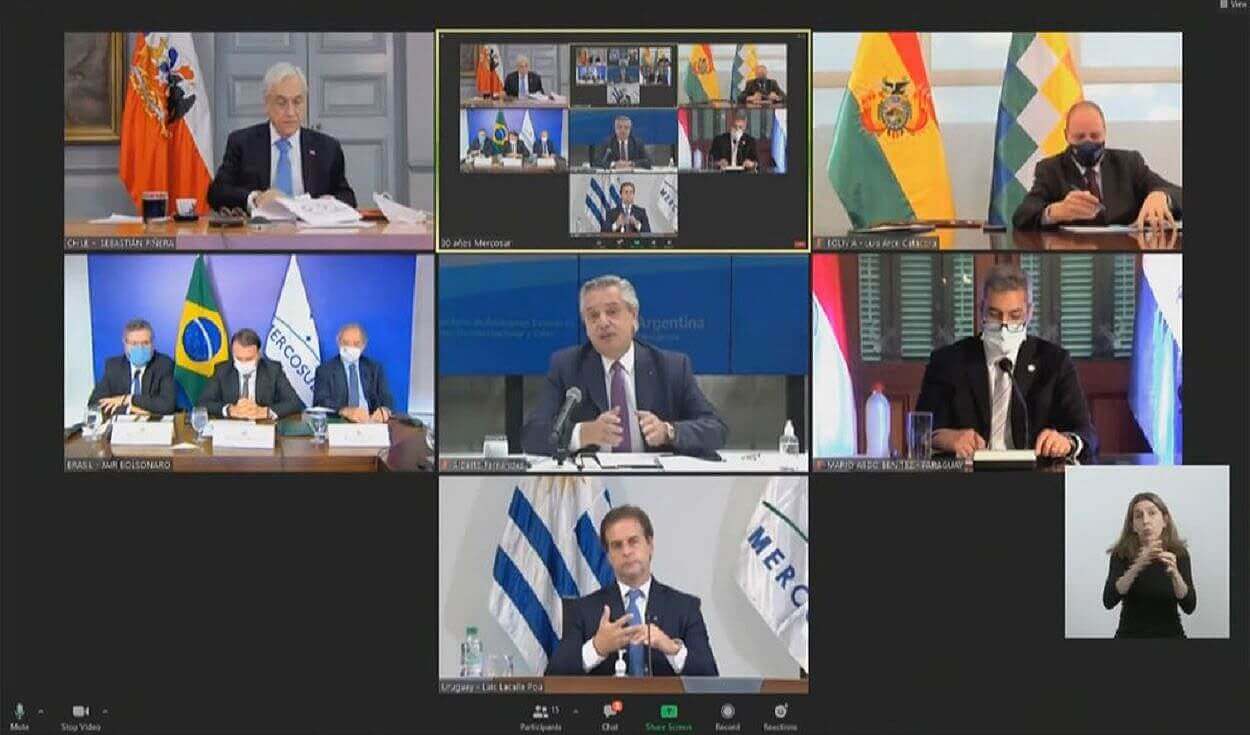On Friday, Mercosur—a South American trade bloc comprised of four members (Argentina, Brazil, Paraguay, and Uruguay), seven associate members (Suriname, Guyana, Colombia, Ecuador, Peru, Chile, and Bolivia), and two observers (Mexico and New Zealand)—virtually held a heads of state summit to commemorate the bloc’s 30th anniversary and discuss regional integration, expanding membership, trade, and COVID-19 vaccines. The meeting was attended by Argentinian President Alberto Fernández, Brazilian President Jair Bolsonaro, Paraguayan President Mario Abdo Benítez, and Uruguayan President Luis Lacalle Pou. Also in attendance were Bolivian President Luis Arce, and Chilean President Sebastián Piñera, who both represent associate member states.
The bloc is currently fractured over members’ inability to enter into unilateral trade deals with non-member states. Uruguay and Brazil are both in favour of relaxing these restrictions. Argentina, though, contends that any trade deals made with non-members must include all the members of Mercosur. However, this means that any state can veto trade agreements for the whole bloc.
Uruguay and Brazil’s collaborative position on relaxing trade restrictions was cemented at a meeting last month in Brazil between Bolsonaro and Lacalle Pou, when the pair agreed to work towards “making Mercosur more flexible”.
Keeping this in mind, at Friday’s summit, Uruguayan President Lacalle Pou said, “Obviously Mercosur does carry some weight, obviously its production carries some weight at the international concert, what should not and cannot be is that it is a burden, we are not willing to make it a corset,” adding, “our peoples, our people, in my case the Uruguayan people, demand from us opportunities to progress ... at different levels and this government feels that it has to respond to that cry of its citizens and responding to that cry means no harm against the interests of other peoples.”
Argentina’s Fernández was, however, more firm in his position and even remarked that if Uruguay was opposed to this then it could leave the bloc, saying, “If we have become a burden I am sorry, the easiest thing to do is to get off the boat.”
The Argentinian President’s position was reiterated by the country’s Foreign Ministry Cabinet Chief, Guillermo Chaves, who took a dim view of Uruguay’s position, saying, “It was an untimely expression by the Uruguayan president that sets Uruguay’s view on negotiating bilaterally with other countries outside the Mercosur bloc.” He added, “We believe that the essence of Mercosur’s fundamental identity is to negotiate jointly with the other blocs or countries, but if each country is allowed to negotiate individually, Mercosur loses its reason for being.”
Uruguay appears to be treading carefully in its spat with Argentina, given that it is highly dependent on the country to import Uruguayan soy, beef, dairy, and other agricultural products. At the same time, Argentinian citizens travel in large numbers to Uruguay’s beaches every year, representing huge tourism income.
Argentina is also at loggerheads with Brazil over the bloc’s common external tariff. At the summit, Brazilian President Bolsonaro said that the “consensus rule cannot be a permanent veto weapon”. Bolsonaro said that this would allow for the “modernisation” of the bloc and for it to adapt to the “fourth industrial revolution” by participating in “regional and global value-added chains, especially now so as to overcome the large damages caused by the pandemic”.
However, Fernández responded that Argentina does not support the reduction of the common external tariff, saying that it was necessary to “preserve a balance between agricultural and industrial sectors, with social justice, in a context of absolute global uncertainty”.
Argentina’s position on trade restrictions appears to be somewhat counterproductive. For example, it opposes Uruguay’s push to sign a unilateral trade deal with China. However, Argentina itself has repeatedly expressed its interest in joining China’s flagship Belt and Road Initiative (BRI).
It is for this reason that Mercosur has been labelled by several trade experts as “one of the least effective entities in the world, both in terms of trade between its members and with external partners”. Considering that the countries collectively boast a population of roughly 300 million and control an area of around 15 million square kilometres, it is widely thought that Mercosur has not effectively leveraged its potential.
Uruguay and Brazil Escalate Dispute With Argentina Over Mercosur Trade Restrictions
At the Mercosur summit, Uruguay and Brazil pushed for members to be allowed to enter into unilateral trade deals and for the common external tariff to be lifted, much to Argentina’s dismay.
March 31, 2021

IMAGE SOURCE: LAREPÚBLICA.PEMercosur leaders met via videoconference to discuss a number of issues surrounding regional cooperation.
